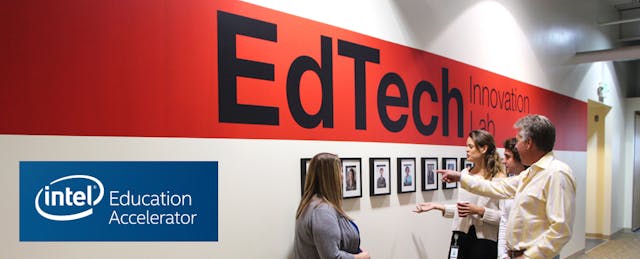Welcome, Intel, to the family of edtech accelerators. The company behind the computer chips that’s given Silicon Valley its name now wants to help early-stage entrepreneurs chipping away at education’s thorniest problems.
The Intel Education Accelerator is open to both K-12 and higher-ed startups, with “special consideration for companies focused on data analytics and adaptive learning,” according to the press release.
The program will be based in GSVlabs in Redwood City, CA, which is home to an “Edtech Innovation Lab” led by Nancy Lue, former Senior Advisor at the US Department of Education. Participants will have access to weekly classes, coaching and opportunities to pilot their products in schools.
The new program was announced during the keynote presentations at the ASU-GSV Summit, which started on Monday (April 6) in Scottsdale, AZ. The Summit is billed as the "Knowledge Economy's Mecca" for conversation and ideas about accelerating learning.
The terms for the Intel accelerator are typical among accelerators: upon acceptance, startups get $50,000 in return for up to six percent of equity. They get another $50,000 in the form of a convertible note after finishing the program. “We’re hoping to have between six and eight companies in the first cohort,” says Elizabeth Broers, program manager for the Intel Education Accelerator.
Participating companies will be expected to relocate to Silicon Valley for the duration of the program, which will run from August to December. “It’s to their benefit to engage in the program physically. We’re structuring with the mentors and speakers on a weekly basis,” explains John Galvin, Vice President and General Manager of Intel Education.
Mentors include Intel executives, along with experts from the banking and investment sectors including Victor Hu (Global Head of Education and Technology at Goldman Sachs) and Matt Greenfield (Managing Director at Rethink Education). Those with an education background include chief technology officers Jill Pierce (McMinn County Schools), Roger Claque (Solano Community College) and Ron Chandler (former Chief Information Officer of Los Angeles and Oakland school districts).
The launch of the Intel Education Accelerator comes on the heels of the AT&T Aspire Accelerator, announced in January and based nearby in San Francisco. There are now eight edtech accelerators in the US, four of which are based in the SF Bay Area.
So what will set Intel apart from the flock?
“We have a history of working in education and deploying large and sophisticated systems in schools around the world,” says Galvin, when asked for a 30-second elevator pitch. “Our interest is absolutely global, and we hope to have applicants from outside from U.S.” He cites Intel Education’s ongoing work with the Mexican government, which started in 2006 and has since resulted in the deployment of hundreds of thousands of PCs and tablets to primary schools across the country. Intel’s global connections, Galvin believes, will be valuable to companies that look to thrive in markets outside the US.
Support for the accelerator comes from Intel Capital, whose education portfolio includes Kaltura and Schoology. Intel also acquired Kno, a digital textbook startup, back in 2013.
GSVlabs' Lue said that her organization will be home base to more than 30 education technology startups and organizations, including the members of the Intel accelerator as well as AT&T's Aspire incubator, which kicked off its application in January and is due to finalize its first cohort next week.
The deadline for applications for the Intel accelerator is May 22, 2015 at noon Pacific Time. Here's the application. Accepted companies will be announced on July 1 and the program will start August 3. The first cohort will wrap up with a demo day on December 2, where they’ll present to an audience of investors.


